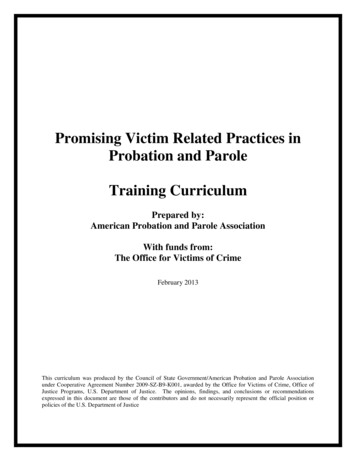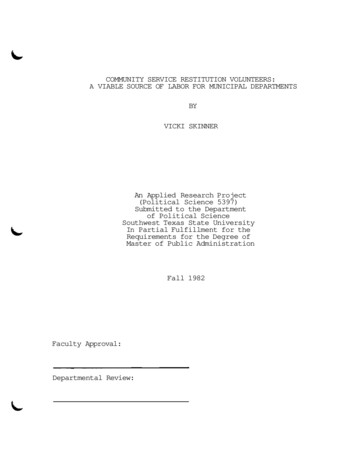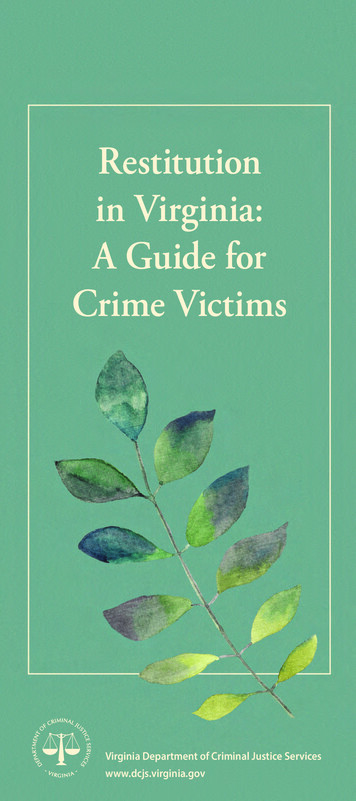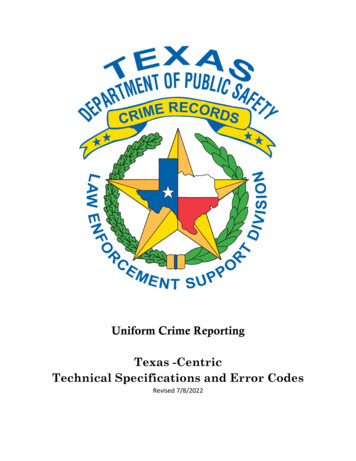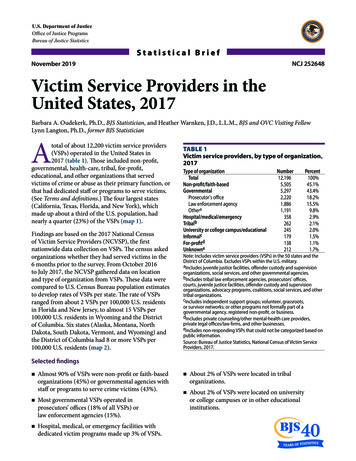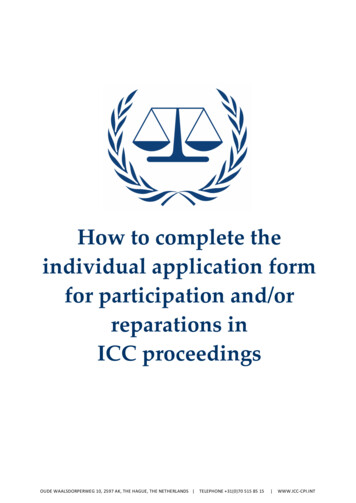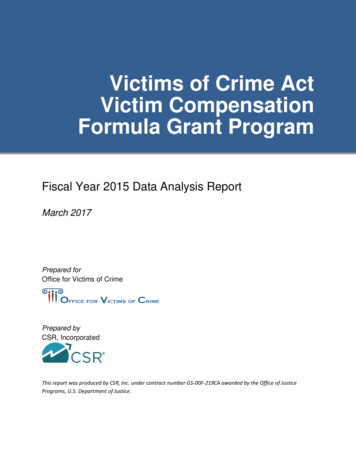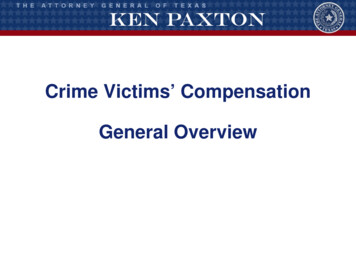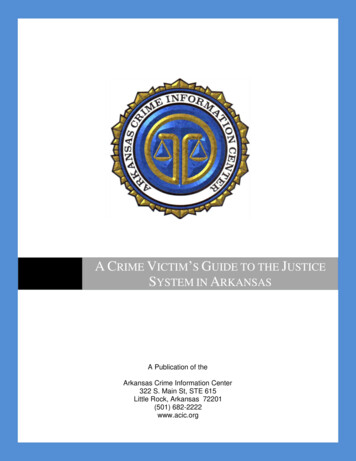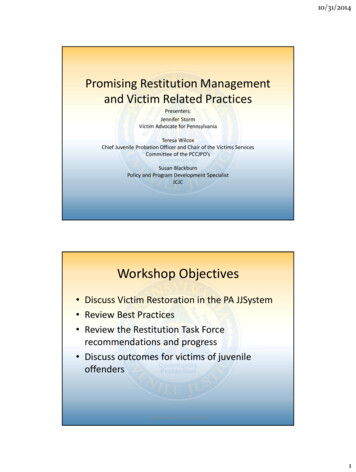
Transcription
10/31/2014Promising Restitution Managementand Victim Related PracticesPresenters:Jennifer StormVictim Advocate for PennsylvaniaTeresa WilcoxChief Juvenile Probation Officer and Chair of the Victims ServicesCommittee of the PCCJPO’sSusan BlackburnPolicy and Program Development SpecialistJCJCWorkshop Objectives Discuss Victim Restoration in the PA JJSystem Review Best Practices Review the Restitution Task Forcerecommendations and progress Discuss outcomes for victims of juvenileoffendersJuvenile Justice Conference 20141
10/31/2014Balanced and Restorative JusticeCommunity ProtectionVictim RestorationYouth RedemptionThree ClientsCommunity – Victims – YouthBalanced AttentionJuvenile Justice Conference 2014JJSES Statement of PurposeWe dedicate ourselves to working in partnership to enhance the capacity ofPennsylvania’s juvenile justice system to achieve its balanced andrestorative justice mission by: Employing evidence-based practices, with fidelity, at every stage ofthe juvenile justice process; Collecting and analyzing the data necessary to measure the resultsof these efforts; and, with this knowledge, Striving to continuously improve the quality of our decisions,services and programs.Juvenile Justice Conference 20142
10/31/2014Victim Restoration Restoring victims to their pre-crime status to thedegree possible– Victims Rights and Services– Restitution– Meaningful Community Service The Accountability Goal– Process of defining and repairing harm with inputfrom the crime victim– Juvenile Justice has responsibility to ensure offendersmeet their obligations and honor and protect victims’rightsJuvenile Justice Conference 2014What we need to know Victim’s constitutional and statutory rights/RulesThe impact of crime on victimsWhat crime victims want and needBest Practices for providing servicesAgencies and services available in the communityfor crime victims and how to access them Juvenile justice outcomes enhancementsJuvenile Justice Conference 20143
10/31/2014Rights And Services forVictims of Crime Amendments to Crime Victims community/information and victim rights/20957/pennsylvania%27s crime victims act/1180822ding Delinquency Rules tting-1744/file-1560.pdf?cb ae9e98 Responsibilities for specific rights VOJO fundingJuvenile Justice Conference, 20137Impact of Crime/Crime Victims NeedsJuvenile crime victims should experiencetangible benefits and satisfaction from theprocess. Safety and Security Information Input into process Restitution Opportunities for restorative practicesJuvenile Justice Conference 20144
10/31/2014Best Practices Victim orientation to juvenile courtCase information and notificationsVictim voice - input into the processVictim impact statementsVictims safety needs generallyVictim needs around offender re-entryJuvenile Justice Conference 2014Best Practices Collaboration and partnerships with victimsservice providers Impact of crime training for juvenile justicepractitioners Victim impact panels Restorative community service Victim impact classes for offending youth Victim offender conferences/dialogue and otherrestorative practices Victim restitutionJuvenile Justice Conference 20145
10/31/2014Restitution Task Force Report andRecommendations To access the full report as well as otherresources and documents: www.Pa-RestitutionTaskForce.info Or www.ova.state.pa.usJuvenile Justice Conference 2014Restitution Philosophy“Restitution is a restorative justice concept thatrecognizes the harm to individual victims andattempts to repair the damage caused by thecrime. It is inherently rehabilitative as it holdsthe offender accountable and provides theopportunity to right a wrong.”Juvenile Justice Conference 20146
10/31/2014Restitution ResearchStudies done by Dr. Barry Ruback and others suggest: Their understanding of the restitution process influencesvictims’ overall satisfaction with the criminal justice system Financial reparation is the number one satisfier for victims inthe criminal justice process When defendants know and understand that they are beingrequired to make payments to compensate the victims oftheir crimes, they are less likely to recidivate then if they areunaware of the restorative nature of those payments.Juvenile Justice Conference 2014Goal of the Task Force The Restitution in Pennsylvania Task Force was to examine the restitutionlaws, rules, policy and processes currently in place throughout theCommonwealth in an effort to maximize the reimbursement of financiallosses to crime victims, and to advance restitution within the context ofrestorative justice for victims, the community, and offenders.Convened in October of 2011Final Report was issued in February of 2013.The report contained 47 RecommendationsThese recommendations were made to the Governor’s Administration, theLegislature, and the Judiciary, as well as to the many county and state levelentities, which through their policies, practices and procedures have animpact upon restitution ordering, collections and disbursement.The overall goal of these recommendations was to enhance the criminaland juvenile justice systems’ effectiveness regarding restitution.Juvenile Justice Conference 20147
10/31/2014Juvenile Justice Subcommittee James Anderson & Susan Blackburn Co-ChairsTheresa Wilcox Chief’s Council RepresentativeExpanded membership outside the task force and utilized conference calls formeetingsIdentified Existing Challenges and best practices in the Juvenile Justice Systemregarding the ordering, collection and disbursement of restitution.Identified themes - general/challenges and issues/best practicesDetermined 3 focus areas for further exploration, discussion andrecommendation developmentSELECTED GOALSTo enhance understanding of the restitution laws, policies and practices in thePennsylvania Juvenile Justice SystemTo enhance consistency of application of policy and practice regardingrestitutionTo enhance the collection of restitution in all cases, but particularly where theoffenders are 18 – 21 years of age.Juvenile Justice Conference 2014RecommendationsThe Task Force identified four overarching factorswhich impact the current state of restitution in PA andare noted within the 47 recommendations:oUniformity of Policy & PracticeoStrengthening AccountabilityoCoordination of InformationoExpansion of AuthorityJuvenile Justice Conference 20148
10/31/2014Uniformity of Policy & Practice1. Convene a group of stakeholders to further reviewexisting restitution law and compile recommendationsfor judicial, legislative or department/-agencyclarifications or revisions. *Juvenile Justice Conference 2014Uniformity of Policy & Practice2. Develop restitution bench books for the juvenile justice andcriminal justice systems. *3. Upon completion of the restitution bench books, develop quickreference sheets for restitution in the criminal and juvenilejustice systems.4. In conjunction with the development of restitution benchbooks, develop educational strategies, training and technicalassistance for bench, bar, victim services, police andprobation. * AOPC is developing a restitution bench book and other resources forjuvenile and criminal court. AOPC trained judges and staff in September of 2013 on best practices. CCJPO’s/JCJC developing Victim’s Guide and a compendium of bestpracticesJuvenile Justice Conference 20149
10/31/2014Uniformity of Policy & Practice5.) Develop a toolkit which would clarify policy and practice around restitution issues, identifyevidence-based and/or promising practices, clarify available enforcement tools and providehelpful articles, brochures, etc.Other areas of needed clarification:– Use of parental liability statute (23 Pa. C.S. §5501) and the parental participation statute (42 Pa. C.S. § 6310)– Ordering restitution to insurance companies– Juveniles with adult co-defendants– Inter-county transfers– Utilization of civil judgments– CPCMS and the collection process– Wage attachments policy/practice– Definition of “case closed” policy/practice Some evidence-based and promising practices to be included in the toolkit are:– Victim Offender conferencing/dialogue– Outcomes reporting– Community service– Restitution funds/restitution programs– Residential programs offer opportunities for youth to earn money for payment of restitution– Utilizing victim impact statements to identify the full impact of the crime and appropriate restitution– Utilizing six-month review hearings to review restitution collectionJuvenile Justice Conference 2014Uniformity of Policy & Practice6. Encourage AOPC and/or the Court Rules Committee to standardize a restitutionorder for use at sentencing/disposition Recommended components of order:– Amount of restitution ordered;– Payment plan details (if appropriate);– Payee(s);– Clarify who has the authority to enforce payment;– Process for application of payments to fines, costs and restitution;– Whether or not payment is delayed;– Ongoing expenses that need to be reviewed at a future time;– Indication if restitution has been satisfied in full or in part prior to disposition.Standardization of a restitution order could be achieved through:– Bench books;– Evidence-based and/or promising practices training;Electronically in CPCMS as a form. *A standardized restitution court order form hasbeen developed.Juvenile Justice Conference 201410
10/31/2014Recommendations 7 & 8 Encourage counties to establish collectionsenforcement units and hire dedicated staff to solelyfocus on collections enforcement efforts within thejurisdiction. * Encourage President Judges to establish restitution,fines and costs contempt courts allocating thejudicial resources to preside over such hearings. *Juvenile Justice Conference 2014General Assembly Recommendations9-10 The General Assembly should consider amending Title 42Section 9728 (b)(5) to establish a mandated minimumpercentage threshold (no less than 20%) for deductions frominmate personal accounts for both county correctionalfacilities and the DOC. * Encourage counties to provide PennDOT with non-paymentinformation so that the newly enacted mandate (Act 146 of2012) for drivers’ license suspension can be utilized, asappropriate. *Juvenile Justice Conference 201411
10/31/2014Recommendation 11-13 Make wider use of dunning letters or overdue notices tonotify or remind defendants that their payments are pastdue and of the sanctions that may be imposed by the court ifthey do not come into payment plan compliance. * Develop restitution funds and restitution programsthroughout both the criminal and juvenile justice systems. * Expand the availability of programs and processes such asVictim Offender Conferencing/Dialogue throughout both thecriminal and juvenile justice systems. *Juvenile Justice Conference 2014Strengthening AccountabilityRecommendations 14 & 15Reinforce the mandate that all Clerks of Court comply with Act 84 of 1998and transmit “copies of all orders for restitution and amendments oralterations thereto, reparation, fees, costs, fines and penalties” to the DOCfor state sentenced inmates (to include form DC-300B and supportingsigned/transcribed sentence orders) and to the county correctional facilityfor county sentenced inmates.*Reinforce the mandate that all Clerks of Court comply with the Act 84 of1998 requirement to file civil judgments when a case balance reaches orexceeds 1,000 and to exercise the option to file below 1,000 if effective ina particular case to enforce payment compliance.Juvenile Justice Conference 201412
10/31/2014Recommendation 16-18 Provide support for on-going research regarding restitutionin Pennsylvania. Establish performance measures for agencies supervisingprobationers and parolees relative to thepayment/collection of restitution. Counties should conduct annual reviews to ensure thatrestitution collections are not superseded by the collectionof county-assessed prison room and board rates and othercounty-established fees and payment allocation priorities.Juvenile Justice Conference 2014Recommendation 19-20 Strengthen existing tools to enhance restitution collectionwith particular attention to the issue of collecting restitutionfrom adjudicated delinquents between the ages of 18 and21. * Several recommendations will address this issue for JPO Encourage the Juvenile Court Judges Commission to workwith the Pennsylvania Council of Chief Juvenile ProbationOfficers to create or modify existing juvenile justice datacollection and reporting processes to accurately and in detailtrack and publish county-specific information regarding theordering and collection of restitution. * DashboardsJuvenile Justice Conference 201413
10/31/2014Coordination of InformationRecommendations 21-22 Identify an overarching agency or organization to continue the efforts ofthe Restitution in Pennsylvania Task Force, such as PCCD, AOPC or theOffice of the Victim Advocate.* The Office of the Victim Advocate has become the lead agency for the task forceand monitor the progress of its recommendations.– Working directly with Senate and House Leadership– Provide advocacy for individual victims– Provide technical assistance to county agencies– Promote the efforts of the Task Force and of interagency coordination Establish or agree to a unique individual identifier to be used acrossexecutive agencies and the judicial branch to better match recordspertaining to individuals owing restitution, court costs and fines in thecommonwealth of Pennsylvania within databases i.e., PennDOT, DPWand AOPC’s records.Juvenile Justice Conference 2014Recommendations 23-25 Develop the capacity for AOPC, the courts, DOC, OVA, PBPPand similar county-level agencies to share information toascertain a defendant’s total fines, costs, and restitutionpayments owed across all cases. Establish a web-based system for victims/survivors toupdate personal contact information related to theirrestitution order. Encourage all counties to establish communication protocolsto determine whether individuals are in payment plancompliance with respect to public assistance eligibility.Juvenile Justice Conference 201414
10/31/2014Recommendation 26 Place defendants on a single electronic payment plan(including restitution owed on juvenile delinquency cases) inthe Common Pleas Case Management System (CPCMS)and/or the Magisterial District Judge System (MDJS)applications maintained by the Administrative Office ofPennsylvania Courts (AOPC) for Courts of Common Pleas andMagisterial District Courts end users. * CPCMSJuvenile Justice Conference 2014Recommendation 27-28 Enable the identification and collection of restitution owedin delinquency cases from offenders under the jurisdiction ofcriminal courts, adult probation departments, DOC andPBPP. * Encourage counties to enter warrants surrounding the issueof failing to pay restitution, fines, and costs, and/or failure toappear for said proceedings into NCIC/CLEAN, asappropriate. Such action will assist in the location ofoffenders outside of the originating jurisdiction and oncelocated could result in the immediate collection of monieswithout the necessity to extradite/transport offenders.Juvenile Justice Conference 201415
10/31/2014Recommendation 29-31 Clarify accepted documentation and practice for DOC inorder to maximize the collection of restitution from inmates;and modify required forms to include all outstandingrestitution, fines and costs owed by an individual uponcommitment to the DOC. * Attach priority to the collection of restitution, fines and costsin the development of (CPCMS) delinquency module. * The Supreme Court of Pennsylvania should considerproviding a capacity to address collections performancemeasures and promote evidence-based and/or promisingpractices to improve the collection of restitution.Juvenile Justice Conference 2014Recommendation 32-33 PCCD, through Criminal Justice Advisory Boards (CJAB),should conduct training and share information with countiesand prison boards on the evidence-based and promisingpractices of other counties that improve the restitutionprocesses, including collection methods, prison policies,costs, etc. * Create or modify existing criminal justice data collection andreporting processes to accurately and in detail track andpublish county-specific information regarding the orderingand collection of restitution. * DashboardsJuvenile Justice Conference 201416
10/31/2014Recommendation 34-35 Provide practical information aboutrestitution to victims.–––Include more information on restitution (documentation, establishment, collection) in the PCCD’sRights for Crime Victims booklet.Educate victims what is restitution, how it is established, collected and distributed?Explore techniques for providing collection information AOPC website access information relativeto their case. Provide practical information aboutrestitution to defendants.––Help offenders understand that payment of restitution plays a vital role in the offenderreformation process as it forces him or her to confront, in concrete terms, the harm his or heractions has caused.Highlight the correlation between restitution and recidivism (offenders who pay a higherpercentage of their court-ordered restitution are less likely to commit a new crime).Juvenile Justice Conference 2014Authority Recommendations 36-38 Maintain the current mandatory threshold of filing civiljudgments as per Title 42 Section 9728 (b)(1) when“judgments for restitution, reparation, fees, costs, fines andpenalties which, in the aggregate, exceed 1,000.” The General Assembly should consider amending Title 42Section 9728 (b)(5) to mandate both county correctionalfacilities and the DOC to make deductions from inmatepersonal accounts. * Expand PennDOT’s authority to suspend and/or prohibitrenewal of driver licenses for payment non-compliance. *Juvenile Justice Conference 201417
10/31/2014Recommendation 39-40 The General Assembly should consider amending relevant statutes toauthorize counties or courts to suspend or prohibit the issuance of stateissued licenses when the applicant is delinquent in the payment ofrestitution, fines or costs. Types of licenses, registrations or otherauthorizations include, but are not limited to: driver’s license; hunting;fishing; professional licenses; vehicle registrations; etc. Licenselimitations or suspensions shall be based on an individual case by casedetermination.The General Assembly should consider amending Title 42 Section 9728(g) Costs, etc., to clearly state that costs incurred by counties in supportof collections enforcement efforts (staff, overhead) shall be borne bydefendants.Juvenile Justice Conference 2014Recommendation 41 & 42 The General Assembly should consider amending Title 42 Section 9730adding section (a. 1) to clarify the authority of the court to assign the wagesof a defendant who agrees to an assignment of income of not more than25% of the defendant’s gross salary, wages or other earnings to the court forpayment of any restitution, fines or court cost. This amendment should alsoimpose obligations on employers in this regard. The Criminal Procedural Rules Committee should consider re-visitingPa.R.Crim.P. 535 and recommend the Pennsylvania Supreme Court adopt arevision authorizing the sentencing court to order any cash bail moneyposted by the defendant to be applied to any restitution, court costs or finesimposed. Alternatively the General Assembly should consider amendingTitle 42 adding a Section 5703 to provide for bail money posted by adefendant to be applied to restitution, fines and costs.Juvenile Justice Conference 201418
10/31/2014Recommendation 43-45 The General Assembly should consider authorizing courts toorder wage attachment for defendants who have beenfound in contempt for nonpayment of restitution, costs orfines. * The General Assembly should consider authorizing courts toorder wage attachment for defendants who have the abilityto pay restitution, costs or fines. * The United States Congress should consider amending theInternal Revenue Code of 1986 Section 6402 to require theIRS to pay any state judicial debt to include overdue costs,fines and/or restitution from any federal income tax refunddue to a delinquent defendant. *Juvenile Justice Conference 2014Recommendation 46-47 The General Assembly should consider enacting or amendingstatute to require the Department of Revenue andPennsylvania Lottery to pay any state judicial debt to includeoverdue restitution, costs and/or fines from any stateincome tax refunds and/or lottery winnings. * The Criminal Procedures Rules Committee should considerexamining current court rules and the rules of otherjurisdictions to consider whether any rules should beamended or new rules adopted to improve the collection ofrestitution. *Juvenile Justice Conference 201419
10/31/2014Outcomes for VictimRestoration/Offender AccountabilityJuvenile Justice Conference 2014A VisionRepairing HarmReducing RiskDecreasing VictimizationJuvenile Justice Conference, 20134020
10/31/2014Thank you and enjoy the conference!Jennifer StormVictim Advocate for Pennsylvaniajstorm@pa.govTeresa WilcoxChief Juvenile Probation Officer and Chair of the Victims Services Committee of thePCCJPO’sTAWilcox@mckeancountypa.orgSusan BlackburnPolicy and Program Development SpecialistJCJCsblackburn@pa.govJuvenile Justice Conference 201421
-Restitution -Meaningful Community Service The Accountability Goal -Process of defining and repairing harm with input from the crime victim -Juvenile Justice has responsibility to ensure offenders meet their obligations and honor and protect victims' rights Juvenile Justice Conference 2014 Victim Restoration What we need to know
